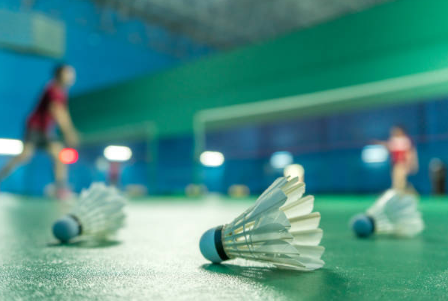Badminton is a popular sport for all ages and fitness levels. Not only does it provide a way to stay active and burn calories, but it’s also a great way to improve your overall health and well-being.
In fact, consistent playing badminton has been linked to many health benefits, including improved cardiovascular health, enhanced cognitive performance, and increased bone density. If you are interested in how you can benefit from playing badminton, read on.
Here are 10 potential benefits of consistently playing badminton.

Improves Heart Health
Since badminton is a fast-paced activity, there is a good chance that you will increase your heart rate. Doing so gives your cardiovascular system a good workout. Not only does it boost stamina but it also improves blood flow.
In fact, a study published in the Journal of Sports Science found that playing badminton boosts your oxygen uptake and increases the efficiency of your cardiovascular system, which boosts your heart health. It can also help you achieve your weekly recommended exercise goals if you exercise consistently.
Enhances Cognitive Function
Studies have shown that playing badminton can improve your cognitive function. In fact, a study published in the Journal of Exercise Science and Fitness found that playing badminton improved executive function. People who consistently played games experienced improvements in decision-making, concentration, and working memory.
At the same time, another study found that badminton may be an effective intervention to improve executive function in adults with mild intellectual disabilities. The researchers found that when using badminton as an intervention, people experienced an improvement in working memory tasks.
Improves Bone Density
Playing badminton requires you to be able to change direction quickly and make explosive jumps. You also tend to use the whole body when playing. These types of exercise put stress on your bones, stimulating bone growth and strengthening. As a result, this can lead to an increase in bone density and strength.
In fact, a study published in the Turkish Journal of Physical Education and Exercise found that badminton players had higher bone density in the thighs, upper arms, lumbar spine, and calves compared to hockey players. This is especially important for people who are prone to osteoporosis or other similar diseases.
Increases Good Cholesterol
When you raise your levels of high-density lipoprotein cholesterol (HDL) (or good cholesterol), you can reduce your risk of heart disease. In fact, one study found that people who played badminton regularly had higher levels of HDL cholesterol.
In addition, their HDL levels were significantly higher than those who participated in other forms of aerobic exercise. This is good news for those who need to raise their cholesterol levels and want to pursue racquet sports.
Reduces the Risk of Death
Not surprisingly, badminton, like other racquet sports, has been shown to reduce the risk of death more than any other type of sport. In fact, a recent study published in the Journal of the American Medical Association (JAMA) showed that while many types of physical activity reduce the risk of death in older adults, racquet sports such as badminton reduce the risk of death from heart disease by 27%.
Reduces the Likelihood of Chronic Diseases
Consistent exercise is an important prevention factor for chronic diseases such as diabetes. In a position statement, the American Diabetes Association states that 150 minutes of structured physical activity per week can prevent or delay the risk of type 2 diabetes in people at high risk.

This is especially easy to achieve by playing badminton, especially since a match usually lasts about 40 minutes to an hour. The longest badminton match on record lasted 2 hours and 41 minutes and was played by Japan and Indonesia.
Reduce Stress and Anxiety
Almost all types of sports are a natural stress reliever, and playing badminton is no exception. Not only does it allow you to relax and vent steam, but it also promotes the release of endorphins, which are the body’s natural feel-good and stress-relieving chemicals.
What’s more, the focus and concentration required to play badminton may also keep your brain busy so that you don’t have time to focus on the things that stress or worry you. Plus, an influx of feel-good hormones may be just what is needed to relieve anxiety.
Enrich Social Connections
Regular social interaction is an important part of your overall health and well-being, and playing badminton can meet this need. Because it’s not a single-player game, it encourages social bonding whether you’re playing with friends, family, or in an alliance. In addition, it is a game that encourages good-natured play and can promote and strengthen relationships.
What’s more, the badminton world is a passionate group. Most badminton communities and group organizations encourage people to join and provide people with a whole new social connection.
Improves Hand-Eye Coordination and Reaction Time
Badminton is a fast-paced sport in which the shuttlecock (or birdie) flies at high speed. To play well, you need good hand-eye coordination, quick reaction time, strong concentration, and the ability to stay alert. Even if you aren’t good at all of these areas at first, they will improve over time.
Also, badminton is not like tennis. You can’t make a shuttlecock bounce once like you would in tennis. Instead, you must be prepared to return the item immediately. So, there’s no extra time to think about your riposte – you just need to react, and react quickly. Therefore, this quick back and forth requires sharp reflexes and quick reaction times. Developing and fine-tuning these skills will also serve you in other areas of your life.
Balance, Coordination, And Agility Are Encouraged
Playing badminton requires balance and coordination. Not only do you need to be able to change direction quickly, but you also need to be able to stay standing while doing this. Even if you don’t have the best balance and coordination to start with, you’ll develop skills in this area, which can help prevent falls and improve your posture.

You’ll also notice improvements in agility and muscle coordination. This can translate into daily functional activities that make it easier for you to perform actions in your daily life.
How to Get Started
With more than 300 million people worldwide playing, badminton is a popular sport for all kinds of people.
If you want to try a sport, the first step is to find a place to play, such as in your yard, at a community center, or at a local park. Some communities even have badminton groups.
You’ll also need some basic equipment. These include rackets, badminton (also known as birdies), and nets. Many sets come with everything you need for a badminton match, but if you already have a net to play with, sometimes you can buy a racket separately.
You should also familiarize yourself with the basic rules of badminton before the match, including how to serve, how to score, and the size of the court. This will help things go more smoothly from the start.
Conclusion
Badminton is a sport that is suitable for people of all ages and fitness levels. In addition, it has many health benefits. Not only can you expect improvements in physical health and heart health, but you may also notice improvements in hand-eye coordination, alertness, reaction time, and cognitive function.
If you’re interested in starting playing badminton, you’ll need to buy gear and find a place to play. While many people play badminton in their own yards, there are also leagues to choose from. Check your local community center to see what is available to you.